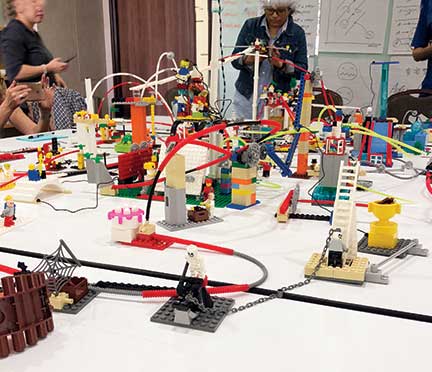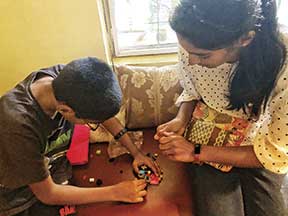Indira Subramanian
Playful learning has been declared as one of the ten innovative pedagogies of 2019, in a report by The Open University, UK. That playful learning should be considered innovative by itself is not surprising, given that its promise, potential and positive effects have been recognized and researched upon for decades now. What is noteworthy is that the report states that these ten innovations, of which playful learning is one, “are already in currency but have not yet had a profound influence on education”. (Innovative Pedagogy 2019, The Open University Report 7)
In fact, Pedagogy of Play, a research project at Harvard University is an ongoing collaboration between Project Zero and the LEGO® Foundation to explore how the principles of play can contribute to giving it a more central role in schooling.
 In the Indian school context, play has been relegated to the sidelines, as a pedagogy of learning. One can go a step further and say that it is increasingly sacrificed as children move up the grades, and is best seen as frivolous, non-cognitive, and dispensable. In early childhood, playing with bricks, blocks and other tactile material, is given attention; however, its powerful impact on learning rests in the hands of a skilful teacher, who understands how to design and craft playful learning environments. So, while early childhood educators may understand the theoretical aspects and forms of play, diligently pored upon during their teacher preparation days, the extent to which they use play to foster serious learning is debatable.
In the Indian school context, play has been relegated to the sidelines, as a pedagogy of learning. One can go a step further and say that it is increasingly sacrificed as children move up the grades, and is best seen as frivolous, non-cognitive, and dispensable. In early childhood, playing with bricks, blocks and other tactile material, is given attention; however, its powerful impact on learning rests in the hands of a skilful teacher, who understands how to design and craft playful learning environments. So, while early childhood educators may understand the theoretical aspects and forms of play, diligently pored upon during their teacher preparation days, the extent to which they use play to foster serious learning is debatable.
When probed as to why play does not occupy a more important space in learning, teachers by and large feel that it is unrealistic given the exam-based culture of the Indian system. However, I would venture to say that this is just one part of it. A largely unexplored area remains how far removed play is, from the teacher’s own learning universe, as a knowledge constructor with her students.
In professional development sessions to explore this dimension, I always marvel at the intense, immersive and reflective experiences that educators eventually have when they re-engage with playful learning, and how it transforms their perception of “play as engaging” to “play as inquiry”.
A playful mindset explores possibilities, is open to risk, can ask thoughtful questions, and benefits from feedback, all while having some good fun! Have you ever wondered why video games are so addictive? One of the reasons is that you get “lives”, in other words, a second (third, fourth or fifth!) chance to try again and learn from your previous mistake. And of course, playful learning incorporates so many of the implicit values that we wish to inculcate in our learners-empathy, sharing, collaboration and lifelong learning.
Here are some immediate ways by which you can foster playful learning in your classroom:
- Ask children to build models of what a concept would look like, for example: Build a model (using bricks, blocks, clay, etc.) to show me what inequality looks like to you? Ask them to share what this representation means, with questions, such as “Tell me more about…”, “Why did you use…,” etc.
- Use games like snakes and ladders to discuss probability in mathematics (what are the chances of you getting a snake or a ladder), or causes and effects, unforeseen circumstances in life, etc.
- Ask children to dismantle an existing toy and reconstruct something new from it to develop creative imagination.
- Collaborative games are also a great way to show children that life does not have to operate in binaries of “win/lose” and that cooperative learning can be a win-win game.
 A fundamental point to remember is that the purpose of using playful learning as a pedagogic tool is the key to ensuring that learning is constructive, meaningful and of course enjoyable! And don’t be discouraged, if children go off on a tangent the first few times that you try this out. Remember, this is just as much a bolt from the blue for them, as they are generally used to the conventional learning environment.
A fundamental point to remember is that the purpose of using playful learning as a pedagogic tool is the key to ensuring that learning is constructive, meaningful and of course enjoyable! And don’t be discouraged, if children go off on a tangent the first few times that you try this out. Remember, this is just as much a bolt from the blue for them, as they are generally used to the conventional learning environment.
However, as you continue to use it consistently, children will go deeper and derive its immense benefits. Asking reflective questions such as, “What did you learn about yourself?” “What did you find easy/difficult?” etc., will extend playful learning values to the realm of self-awareness and give children an insight into their own learning curve.
Finally, let us not forget that India has a rich tradition of indigenous games which are easily created, but which carry with them deep pedagogic values. This is an opportunity to redefine and revisit learning in our classrooms and to make joyful learning a serious possibility.
The author brings in more than two decades of experience in education. She works with teachers and heads across India and internationally to improve learning experiences in the classroom. Playful learning is one of many areas that she addresses in her work as a teacher educator. She can be reached at seriousplayforschools@gmail.com.
